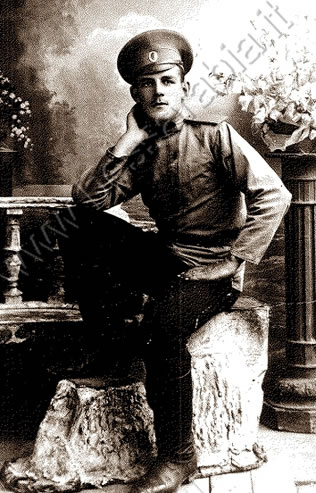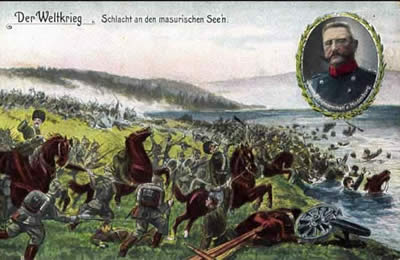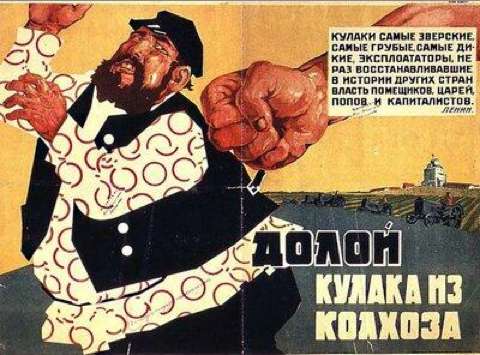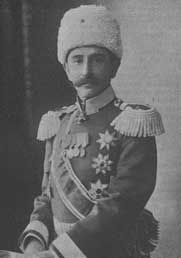![]()
![]()
The German settlements in the Black Sea Region1
(part 2 of 3)
The First World War

Oskar Winkler,
son of a German colonist from Sarata,
in Russian uniform, about 1915
(Courtesy of the Winkler family)
The outbreak of the World War I brought about a very difficult time for the German colonies in Russia. The colonists were drafted to serve in the Russian Army from the first day of the war. It began just before the time during which the colonists focused their energies on the harvest. The conscription of young men into the Russian Imperial Army in service of the Russian fatherland was felt very strongly in the colonies due to the loss of their labour at this critical time.
More than 100.000 ethnic Germans served loyally in the Tsarist army.
Inadvertently, however, orders were issued that proved to be favorable for the Germans.

1st world war: battle of the Masurian Lakes
At the beginning of the war, many Germans on the Western Front fought against German/Austrian forces. Many of them fell in the battle of the Masurian Lakes or were captured by the German army. A short time later they were organized into special units, battalions comprised mostly of workers and settlers and transferred from the Western front to the Ottoman Caucasus front, where more died of typhus and plague, than from the enemy's bullets.
The women remained at home and the children, grandfathers and grandmothers strove to keep up their property and to maintain the economy. Requisitions were endless for feed and grain for the cattle and horses, carts and harnesses were endless. Young boys and even girls worked in the quarries; men completed the heavy gravel work and road construction on hills and valleys. Billeting of the military was required of the tormented villagers. A Russian officer said admiringly:
"No, these Germans! Their villages are endless! Since you can pick and pick, without end!”
Fieß Christian: Heimatbuch Sarata 1822-1940, Mühlacker, 1979, S. 178;

Kulaks out! (Poster of the year 1931)
As everywhere else, the ensuing war years would bring greater difficulties. When the war started, the large military defeats sustained by the Russian army on the Western Front, the terrible loss of life and the growing economic difficulties resulted in an intensification of the agitation against the Russian- Fieß Christian: Heimatbuch Sarata 1822-1940, Mühlacker, 1979, S. 178; Germans, the kulaks2, “the peaceful conquerors" who were vilified as alleged helpers of Germany.
Thus began the process of Russification of the German colonists in Russia. On August 18, 1914 a decree was issued forbidding the use of the German language in public. If heard speaking German in public the offender was required to pay a fine of 3.000 rubles (about 6.000 Reichsmark) or to serve a sentence of three months imprisonment.

Mikhail Isaevich Ebelov
In November 1914, M. J. Ebelov, Commander of the forces in the Odessa Military Region, barred any gathering of Germans (more than 2 people) in the streets and prohibited the holding of religious services in the German language. Only prayer and singing were allowed in the German language. The "Vorposten Wilhelm II" (Outposts of Wilhelm II), as Germans were called, had to endure every kind of abuse. In the churches, the floorboards were ripped up because, it was thought that German machine guns would be secretly brought by German airmen and then they would have been hidden under the floorboards.
In 1915, German newspaper and book publication was banned and on July 14, 1915, the German schools were closed. The German teachers received a letter from the school district informing them that that they didn't conform to the requirements. This resulted in a Russian teacher replacing them and, the German teachers were subject to immediate dismissal from their positions. Shortly after this they all were conscripted.
1 Thanks to S. Winkler for help with the English translation of this page
2 Kulak = A disparaging term for medium and large Russian farmers. Kulak, which literally translated means "fist," refers to someone who holds his possessions 'firmly in his fists' and was used in the sense of "usurer" or "village capitalist".
After the October Revolution of 1917 and in the course of collectivization measures (1929/30) under Stalin, the term kulak became a profanity and extended to all rural "exploiters" who were to be liquidated as an enemy 'class'. At the highest point of collectivization (1932), it included minor agricultural property, such as a cow or the employment of day labourers or servants and it meant 'Kulakentum' (someone who belongs to the kulaks). It resulted in coercive measures: first, the requirement of higher deliveries, then expropriation and finally, deportation to deserted areas or banishment in the Gulag (the penal system of the Union of Soviet Socialist Republics consisting of a network of labor camps.) Often, the family members of the "Kulaks" and even alleged kulak mercenaries were also persecuted.
The Kulaks were divided into 3 categories:
- the farmers of the 1st category were considered "counter-revolutionary elements" who were shot immediately, or put in a labor camp of the GPU (State Political Directorate). Their property was confiscated and their relatives fell among the deported persons.
- The Kulaks of the 2nd category were considered less dangerous, but considered "terrible exploiters". They were expropriated, arrested and deported with their families to remote areas.
- The Kulaks of the 3rd category were considered to be "faithful to the State" and their property was expropriated and they were resettled to infertile and uncultivated zones of their districts.




